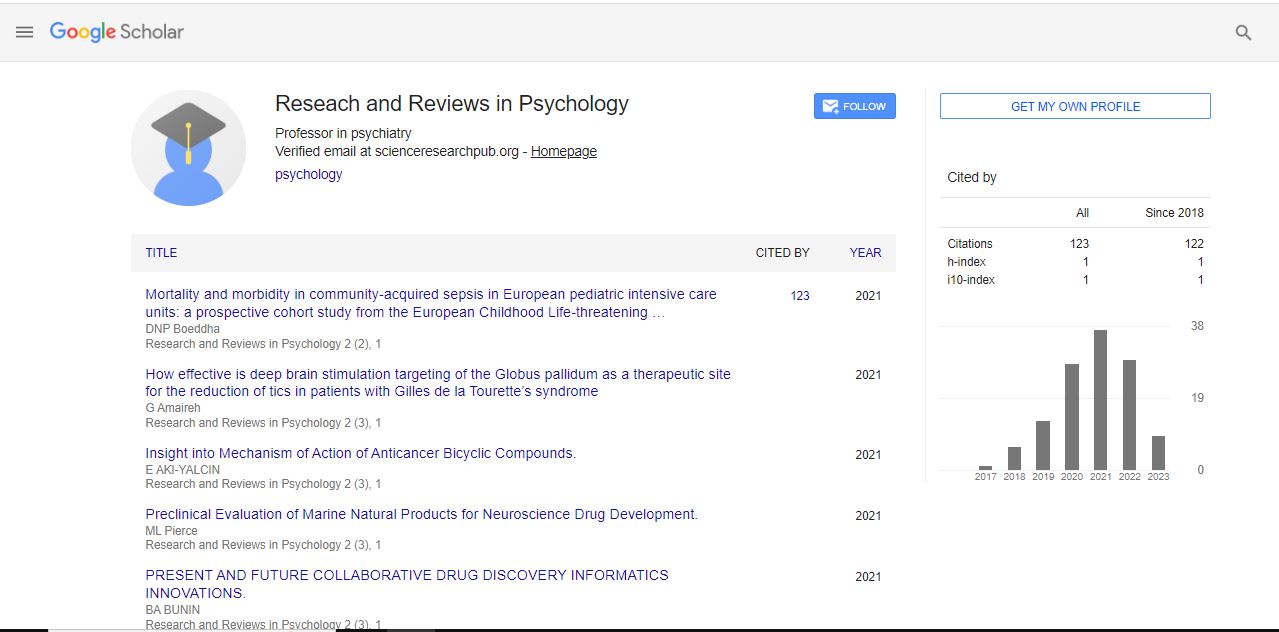Perspective, Res Rev Phys Vol: 4 Issue: 1
Mechanism of Cognitive Behavioral Therapy and its Limitations
Castilho Miller*
1Department of Neuropsychology and Cognitive Behavioral Intervention, University of Coimbra, Coimbra, Portugal
*Corresponding Author: Castilho Miller
Department of Neuropsychology and Cognitive Behavioral Intervention, University of Coimbra, Coimbra, Portugal
E-mail: miller.c@gmail.com
Received date: 04 March, 2023, Manuscript No. RRPY-23-95555; Editor assigned date: 06 March, 2023, PreQC No. RRPY-23-95555 (PQ); Reviewed date: 20 March, 2023, QC No. RRPY-23-95555; Revised date: 27 March, 2023, Manuscript No. RRPY-23-95555 (R); Published date: 06 April, 2023, DOI: 10.4172/rrpy.1000329.
Citation: Miller C (2023) Mechanism of Cognitive Behavioral Therapy and its Limitations. Res Rev Phys 4:1.
Abstract
Description
Cognitive Behavioral Therapy (CBT) is an established and effective type of psychotherapy that aims to change negative patterns of thinking, behavior, and emotional responses. It is based on the principle that individual’s thoughts, emotions, and behaviors are interconnected, and improving it can affect the others. CBT has been widely used to treat a wide range of mental health disorders, including anxiety, depression, obsessive compulsive disorder, post-traumatic stress disorder, and drug addiction.
Principles of cognitive behavioral therapy
The fundamental principles of CBT are based on the cognitive theory of mental health. According to this theory, negative patterns of thinking can result in adverse feelings and behaviors. Cognitive Behavioral Therapy helps individuals to identify and challenge these negative thoughts, replacing them with more positive, efficient thoughts. CBT also focuses on changing maladaptive behaviors, such as prevention and management of drug addiction that perpetuate negative emotions and thoughts.
Techniques of cognitive behavioral therapy
Cognitive Behavioral Therapy utilizes several techniques to obtain its therapeutic objectives. One of the most common techniques is cognitive restructuring that involves identifying and challenging negative thoughts and replacing them with more positive and realistic ones. This technique helps individuals to develop a more balanced perspective and reduce negative emotions such as anxiety and depression. Another important technique used in CBT is Psychotherapy. This technique involves gradually exposing individuals to the circumstances or objects that cause anxiety or fear, allowing them to develop strategies and overcome their fears. Psychotherapy is particularly effective in treating anxiety disorders such as phobias and Post-Traumatic Stress Disorder (PTSD). Behavioral activation is another technique commonly used in CBT. This technique focuses on identifying and changing maladaptive behaviors that contribute to depression and other emotional disorders. Establishing achievable goals and stimulating in events which encourage positive emotions and a sense of achievement.
Effectiveness of cognitive behavioral therapy
Cognitive Behavioral Therapy has been extensively examined and established as an effective treatment for a wide range of mental health disorders. In particular, it has been demonstrated to be effective in the treatment of anxiety disorders, depression, and PTSD. CBT has been demonstrated to be effective in the treatment of schizophrenia and bipolar disorder when associated with medication. CBT has the advantage of functioning as a relatively short-term treatment, typically lasting between 12-20 sessions. When compared to other types of psychotherapy, this creates it a more cost-effective and time-efficient treatment option.
Limitations of cognitive behavioral therapy
While CBT is generally an effective treatment for many mental health disorders, it may not be effective for everyone. Some individuals may not respond well to the cognitive restructuring techniques used in CBT, and may require alternative forms of therapy. Additionally, CBT may not be appropriate for individuals with severe mental health disorders or those with significant chronic conditions.
Cognitive Behavioral Therapy (CBT) is an established and effective form of psychotherapy that has been widely used to treat an extensive variety of mental health disorders. It is based on the concepts that thoughts, emotions, and behaviors all are interconnected, and that changing can affect the others. To obtain its therapeutic objectives, CBT utilizes a variety of techniques, including cognitive restructuring, pharmacological intervention, and behavioral management. While CBT has been found to be an effective treatment for many mental health disorders, it can't be effective for everyone, and other forms of therapy may be required. CBT is a comprehensive approach to mental health treatment that can help individuals in developing management mechanisms, enhancing anxiety and depression, and improving their overall quality of life.
 Spanish
Spanish  Chinese
Chinese  Russian
Russian  German
German  French
French  Japanese
Japanese  Portuguese
Portuguese  Hindi
Hindi 